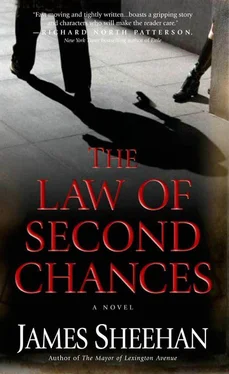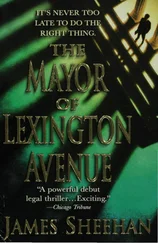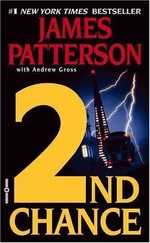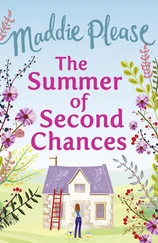James Sheehan - The Law of Second Chances
Здесь есть возможность читать онлайн «James Sheehan - The Law of Second Chances» весь текст электронной книги совершенно бесплатно (целиком полную версию без сокращений). В некоторых случаях можно слушать аудио, скачать через торрент в формате fb2 и присутствует краткое содержание. Год выпуска: 2013, ISBN: 2013, Издательство: James Sheehan, Жанр: Триллер, на английском языке. Описание произведения, (предисловие) а так же отзывы посетителей доступны на портале библиотеки ЛибКат.
- Название:The Law of Second Chances
- Автор:
- Издательство:James Sheehan
- Жанр:
- Год:2013
- ISBN:9781630011659
- Рейтинг книги:3 / 5. Голосов: 1
-
Избранное:Добавить в избранное
- Отзывы:
-
Ваша оценка:
- 60
- 1
- 2
- 3
- 4
- 5
The Law of Second Chances: краткое содержание, описание и аннотация
Предлагаем к чтению аннотацию, описание, краткое содержание или предисловие (зависит от того, что написал сам автор книги «The Law of Second Chances»). Если вы не нашли необходимую информацию о книге — напишите в комментариях, мы постараемся отыскать её.
The Law of Second Chances — читать онлайн бесплатно полную книгу (весь текст) целиком
Ниже представлен текст книги, разбитый по страницам. Система сохранения места последней прочитанной страницы, позволяет с удобством читать онлайн бесплатно книгу «The Law of Second Chances», без необходимости каждый раз заново искать на чём Вы остановились. Поставьте закладку, и сможете в любой момент перейти на страницу, на которой закончили чтение.
Интервал:
Закладка:
Johnny just smiled sheepishly. He was having a great time smoking cigarettes and drinking beer .
He had only played a few hands when Frankie called him over .
“Johnny, sit out a hand or two. I want to talk to you.”
Johnny didn’t hesitate. You didn’t say no to Frankie. Not that he would beat you up or anything-Frankie wasn’t like that. He was just one of those guys you didn’t say no to .
Johnny followed Frankie into the kitchen. He was glad they were away from the others. If he had done something wrong he didn’t want the whole world to know about it .
“What’s up?” he asked as nonchalantly as he could, his knees knocking .
“I’ve been watching you play football over at the Hamilton on Saturday mornings.” The Hamilton was a clearing in Central Park where the younger guys in the neighborhood would get together to play tackle football. All the older guys had played there at one time or another. It was like a rite of passage before you hit the bigger field. One of the sideline markers just happened to be a statue of Alexander Hamilton. You had to be very careful not to run into it while running an out pattern .
“Yeah,” Johnny replied. “So?”
“So,” Frankie said, “I think it’s time you think about coming out for the Lexingtons.”
“Me?”
“Yeah, you. Tryouts start next week. I wanna see you there.”
“Sure thing, Frankie. I’ll be there.”
Johnny was so excited he almost couldn’t contain himself. The Lexingtons were the neighborhood football team. All the great athletes from the neighborhood had played on the team. Frankie was one of the present stars and was the unofficial captain. Now it was Johnny’s turn to play with the big boys. Of course, Frankie had only invited him to try out. There was no guarantee he was going to make the team. And what if he got cut? He’d be the laughingstock of the whole neighborhood .
Yeah, Johnny thought as he walked home that evening, living in the neighborhood certainly was stressful .
6
Jack began working on Henry Wilson’s case by reading volumes of material: trial transcripts, appellate briefs, and the investigative files from both the state’s attorney’s and the public defender’s offices. It took him two weeks to finish. If he decided to take the case, he had six weeks before Henry’s scheduled execution to file a motion for a new trial, set an evidentiary hearing before a circuit judge, and put forward enough newly discovered evidence to convince the judge to grant a new trial. Time certainly weighed against them, but it was not the biggest hurdle. In order to meet the “newly discovered evidence” standard, Jack would have to produce some evidence that no other counsel representing Wilson in the past could have discovered; evidence that had been available back then but inadvertently overlooked didn’t pass the “newly discovered evidence” test. It was a next-to-impossible standard, and so far he had nothing to go on.
He did confirm, however, that Wilson had told him the truth: there was no physical evidence linking him to the murder of Clarence Waterman. His conviction rested solely on the testimony of one man, David Hawke, and neither the snitch nor his cousin was ever charged with Waterman’s murder. Those facts alone lent credibility to Wilson’s claim of innocence.
He hashed it all out with Pat one night after dinner. Pat was reading a book in the living room while Jack had Wilson’s file spread out on the dining room table nearby.
“I don’t think this is worth it,” he told her. “I’d be okay getting Henry Wilson off death row, but not out of prison.”
“Is that your decision to make, Jack? Aren’t you supposed to simply determine whether the evidence was sufficient to prove he committed the murder?”
“It’s a little more complicated than that. My feelings about the case are always part of my decisions, Pat. They have to be. This isn’t an intellectual exercise for me-or an economic one. I have to believe I’m doing the right thing.”
“I understand,” Pat replied. “But you’ve always said that the evidence should decide a person’s guilt or innocence and nothing else. Aren’t you getting away from that?”
“I guess I am. This guy is so angry, though. I just don’t know if I want to make the effort to put him back on the street.”
“You only met him once. Why don’t you give him the benefit of the doubt for now and make your decision based on the evidence? If it’s not the right decision then you probably won’t succeed.”
“What does that mean?”
Pat smiled at him. “Things happen for a reason. All you can do is your part.”
Jack thought about it for a minute or two. “Maybe you’re right,” he admitted. “There is already a question in my mind about whether Wilson is guilty or not. I’ll continue the investigation. If there is enough evidence to move for a new trial, I’ll file the motion. After that it’s in God’s hands.”
Jack decided to continue his investigation by talking with Henry’s original lawyer, a distinguished Southern gentleman named Wofford Benton who was now a sitting circuit judge in Bartow, Florida.
Wofford Benton was an old Florida cracker born and raised in Bartow, a cozy little town in the central part of the state. He loved to tell folks that he never wore shoes until he was five years old. He spent his youth hunting and fishing and riding horses and herding cattle. When he graduated from high school, Wofford, like his daddy before him, moseyed on up to the University of Florida to get his college education. He stayed for seven years and left with a law degree.
Wofford’s first job was in the public defender’s office in Miami. Although it was a successful career move, Wofford never felt comfortable in the big city, and after twenty years he quit and went home to Bartow to run for judge.
They met for lunch at the Log Cabin Inn, an upscale steak house just outside of town where the local businessmen hung out. Inside, it looked like a real log cabin, complete with a fireplace that was hardly ever used. Among the concessions to modernity were the plush, dark blue carpeting and the seats upholstered in black leather. Judge Benton was already seated at his favorite table when Jack arrived. He was in his mid-sixties now, with a bald pate and a stomach that looked like it didn’t miss too many meals. He had a big cigar wedged in the right side of his mouth, although it wasn’t lit. The waitress came over to take Jack’s drink order as soon as the lawyer sat down. She also had a message for the judge.
“Judge,” she started with a thick Southern accent, “Walter suggests you try the prime rib sandwich today. He says it’s real good.”
Wofford smiled at Jack. “Walter’s the chef. They treat me right here,” he said proudly. “All right, Sally, you tell Walter to fix me one of those sandwiches. He knows how I like it. How about you, Jack?”
Jack wasn’t much of a red-meat eater, but he was looking for information.
“I’ll have the same,” he replied. “Medium. And a glass of water.”
“So what can I do for you, son?” Wofford asked when Sally had left.
“Well, Judge, as I told you over the phone, I’m looking into the Henry Wilson case to see if there is any basis to file a motion for a new trial.”
Henry’s trial had been almost eighteen years ago, and the judge had been a little sketchy on the details when Jack had called him initially.
“I didn’t remember the case when you first called, but I do now. I can’t see his face, but I remember Henry Wilson was a big, imposing man and he was a career criminal. I don’t know if I can help you any more than that.”
Читать дальшеИнтервал:
Закладка:
Похожие книги на «The Law of Second Chances»
Представляем Вашему вниманию похожие книги на «The Law of Second Chances» списком для выбора. Мы отобрали схожую по названию и смыслу литературу в надежде предоставить читателям больше вариантов отыскать новые, интересные, ещё непрочитанные произведения.
Обсуждение, отзывы о книге «The Law of Second Chances» и просто собственные мнения читателей. Оставьте ваши комментарии, напишите, что Вы думаете о произведении, его смысле или главных героях. Укажите что конкретно понравилось, а что нет, и почему Вы так считаете.












